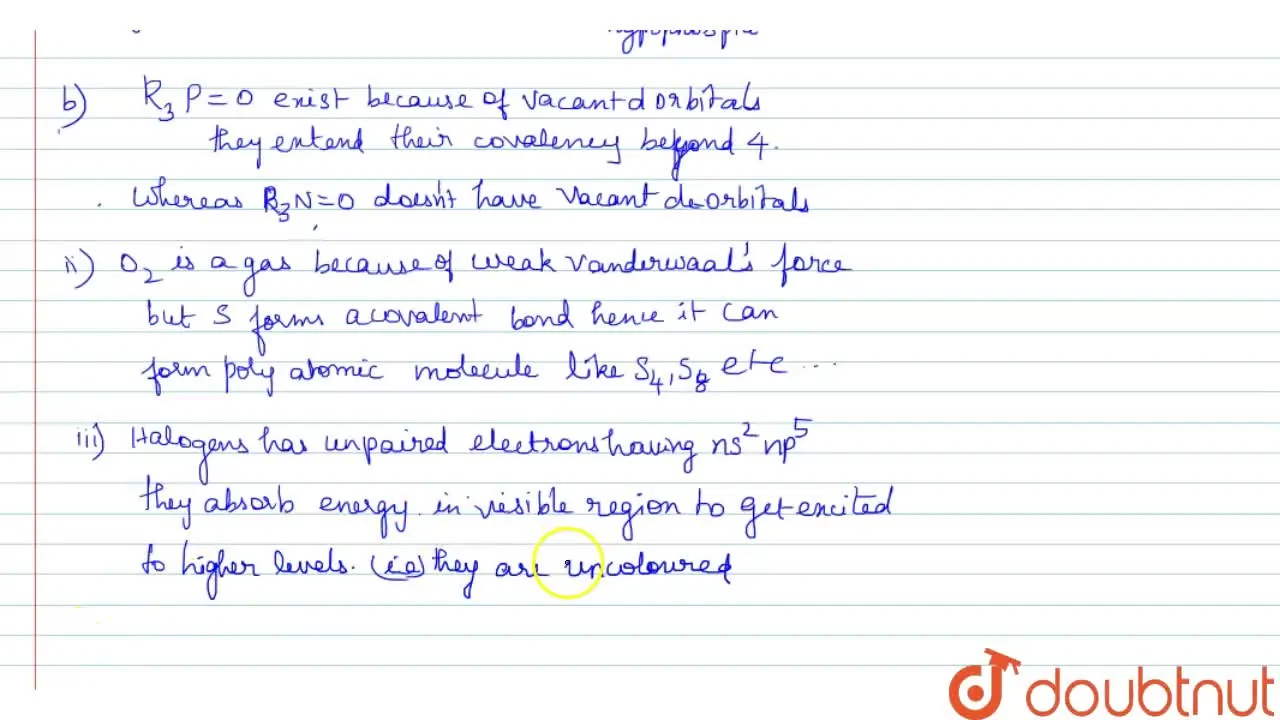(a) Complete the followingh chemical reaction equations :
(i)
(ii)
(b) (i) why does exist but does not ? (R=alkyl group)
(ii) why is dioxygen a gas but sulphur a solid ?
(iii) why are halogens coloured ?
(a) (i)
(ii)
(b) (i) N (unlike P ) lacks the d-orbital. This restricts nitrogen to expand its co-ordination number beyond four.
(ii) Oxygen exist as a diatomic molecule while sulphur exists as a polyatomic molecule hence sulphurs mass will be more therefore it will have more van der waal forces, hence more boiling point. Diatomic oxygen, will have boiling point therefore, it is present in gaseous state.
(iii) Halogens are coloured becasue they possess a valene shell electronic configuration . This means that they contain unpaired electrons in their outer most p-orbital. these electorns absorb light and get promoted to higher orbitals.
When they returs to their ground state, they emit radiations which fall in the visible region of electromagnetic spectrum. Hence, they appear as coloured.
Related Playlists
- BOOK - XII BOARD PREVIOUS YEAR PAPER ENGLISHCHAPTER - XII BOARDSEXERCISE - General Instrucations31videos
XII BOARDS
- BOOK - XII BOARD PREVIOUS YEAR PAPER ENGLISHCHAPTER - XII BOARDSEXERCISE - Questions29videos
XII BOARDS
- BOOK - XII BOARD PREVIOUS YEAR PAPER ENGLISHCHAPTER - XII BOARDSEXERCISE - Outside Delhi : SET-III13videos
XII BOARDS
- BOOK - XII BOARD PREVIOUS YEAR PAPER ENGLISHCHAPTER - SAMPLE PAPER 2019EXERCISE - SECTION: D1videos
SAMPLE PAPER 2019
Similar Questions
Why does R3P=0 exist but R3N=0 does not (R= alkyl group)?
View SolutionComplete the following chemical reaction equations :
(i) XeF2+H2O→
(ii) PH3+HgCl2→View SolutionComplete the following chemical reaction equations :
(i) l2+HNO3(conc.)→
(ii) HgCl2+PH3→View SolutionComplete the following chemical reaction equations :
(i)KClO3Heat−−−→MnO2
(ii) XeF4+H2O→View SolutionComplete the following chemical equtions :
(i) Ca3P2+H2O→
(ii) Cu+H2SO(conc)→View SolutionComplete the following chemical equations :
(i)P4(s)+NaOH(aq)+H2O(l)→
(ii) I−(aq)+H2O(l)+O3(g)→View SolutionComplete the following chemical equation :
(i) P4+NaOH+H2O→
(ii)XeF4+O2F2→View SolutionComplete the following chemical equations :
P4(s)+NaOH(aq)+H2O→(ii)Ca3P2(s)+H2O(l)→View SolutionComplete the following chemical equations :
(i) HgCl2+PH3→(ii)SO3+H2SO4→
(iii) XeF4+H2O→View SolutionComplete the following chemical reaction equations :
(i) NaOH(cold and dilute)+Cl2→
(ii)XeF6(excess)+H2O→View Solution


